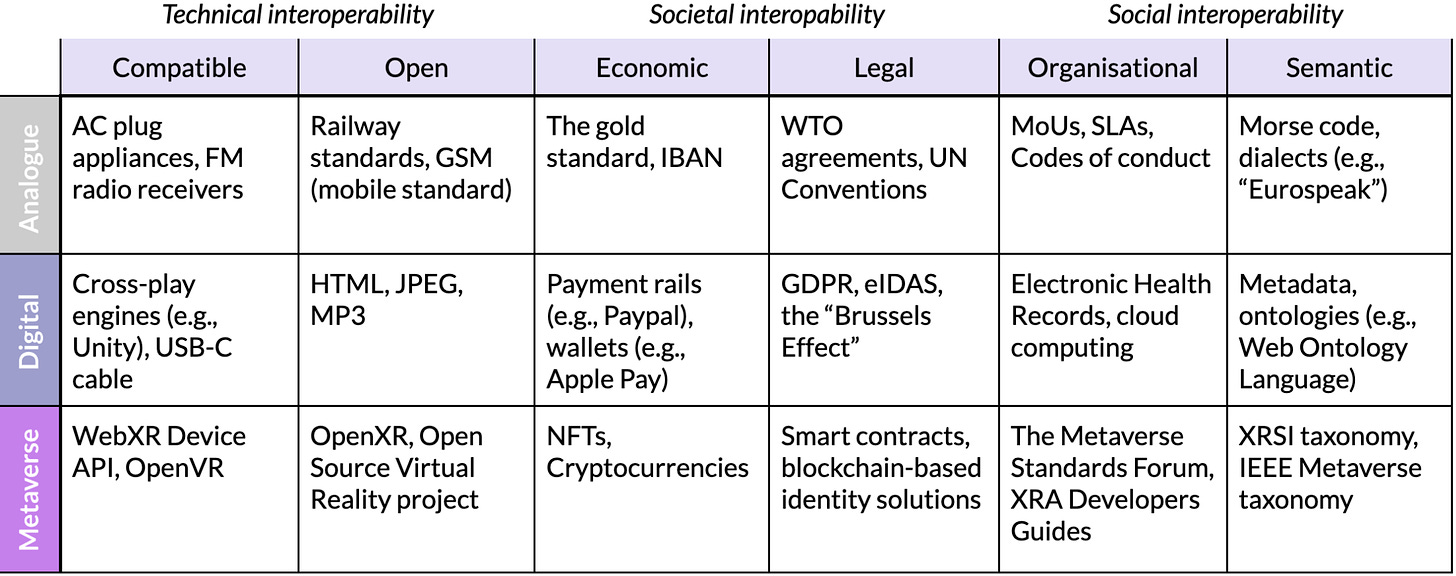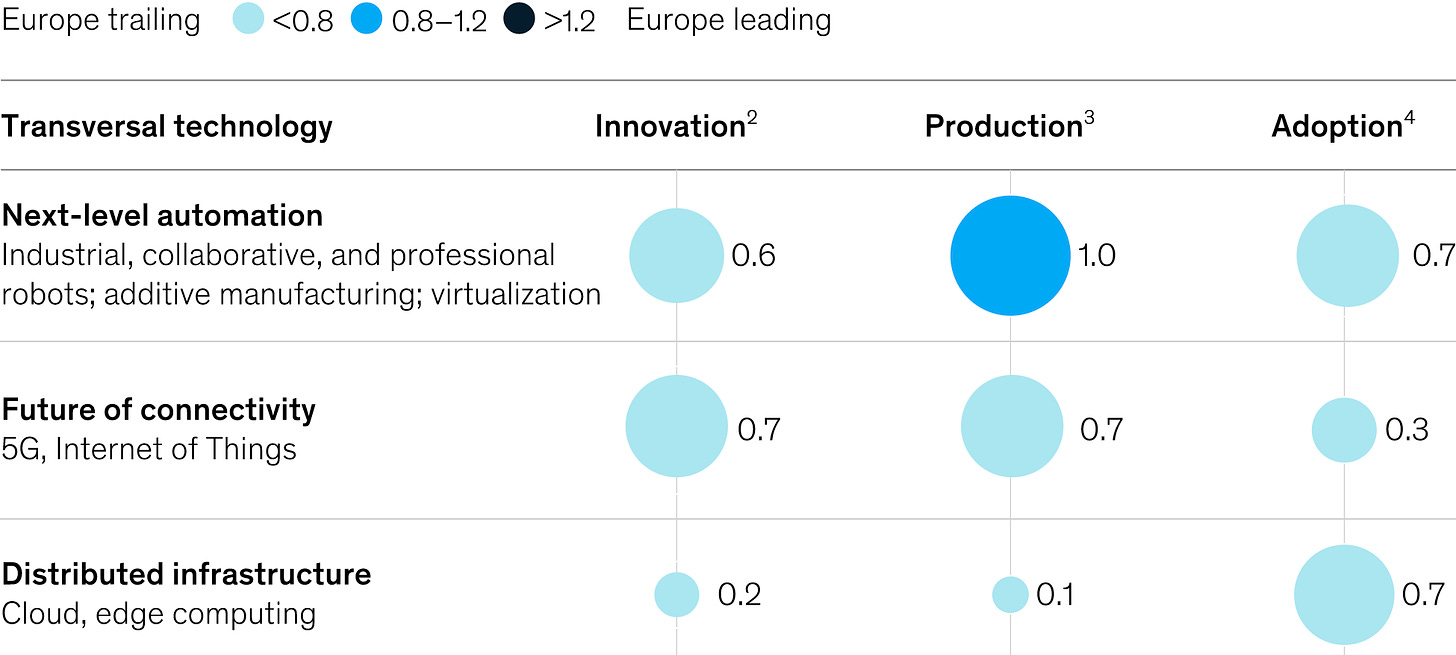Hello and welcome to Metaverse.EU, a monthly newsletter covering metaverse policy and business in the EU.
Interoperability: an overview
Devices need to communicate to share information. How do they know what to say?
Interoperability is the ability of different systems (e.g., hardware, software, protocols) to work together and share information
Because a device can speak Ethernet or WiFi, it can send (or receive) packets of data across networks. The Internet Protocol (IP) is one map it can use, and is pretty handy since most modern devices have an “IP address.” To ensure the packet arrives in one piece, it should go via the Transport Layer Protocol (TCP)—the rules of the road.
This set of instructions—the TCP/IP layer or “internet protocol suite”— was developed in 1986 by the Internet Engineering Task Force, as an open (free and public) standard. It is the foundation on which the entire internet is built.
It also exemplifies how an open standard can enable technical interoperability, allowing an array of products (laptops, phones, appliances) to communicate. Additional standards help devices understand websites (HTTP), music (MP3), and images (JPEG). Proprietary standards configured to be compatible with each other become interoperable.
Communities achieve societal interoperability through convergent policies, rules, and laws. The gold standard, for example, was a common denominator for different currencies; an economic rule that made it easier for countries to trade. Regulation can compel or incentivise alignment: the “Brussels Effect” describes the phenomenon of non-EU companies complying with EU laws to continue working with the bloc.
Cloud computing has significantly improved social interoperability by providing organisations with new means for sharing and accessing information. Semantics also help: EU folk are guilty of “Eurospeak”, a dialect of new meanings (“assist” rather than “attend to” meetings; “externalise” rather than “outsource” tasks) and coinages (“comitology”, “decommit”, “planification”) that smoothen transcontinental English and obfuscates the bloc from national pressures.
Many consider interoperability the holy grail for the metaverse, claiming an open, seamless, and accessible metaverse will be more appealing to users and more likely to be a success. Indeed, the boom of metaversy platforms such as Fornite and Roblox is partly owing to their interoperable features: players can interact, buy customisables, and carry collectables across over 10 different devices and consoles.
The extent to which each type of interoperability is necessary, desirable or urgent for the metaverse is still unclear.
Most pressing is the need to bring metaverse organisations together and agree on what it actually is. The XR Association is leading on the former; the World Economic Forum is one organisation working on the latter.
Less obvious are the ideal technical standards. While standardisation can facilitate a healthy ecosystem, some claim there’s a trade-off with innovation. While ideal standards remain unclear, the industry should focus on building compelling use cases to entice investment.
Least urgent is societal interoperability. One vision of the metaverse imagines users transversing their avatars from virtual gyms to virtual offices to the real world and back again. This vision requires tools to maintain assets and identity across platforms—but it also presumes a level of interest and consensus that is far off.

Into the EU metaverse…
Policy (tracker ⌛)
It’s a date. The European Commission’s 🇪🇺 nonlegislative initiative on the virtual worlds will be published on 3 May, according to its tentative agenda.
Spring break. The European Parliament’s 🇪🇺 internal markets (IMCO) committee will report on virtual words, according to its work-in-progress, but the file is on hold until spring.
Nothing but the truth. Meanwhile, Parliament’s 🇪🇺 legal affairs (JURI) committee has called a hearing on the metaverse, according to Euractiv.
Connecting the dots. “The amount of data exchanged – and harvested – is larger than ever and will increase… The metaverse and virtual worlds… are making this even more evident,” proclaimed Commission 🇪🇺 President von der Leyen when launching a consultation on digital connectivity in early 2023 (read about the importance of connectivity here).
Flag-bearer. Eva Maydell MEP 🇪🇺🇧🇬 was the sole MEP at Davos, the World Economic Forum’s annual summit. Maydell spoke about the metaverse: “Two words sum up the metaverse right now: opportunity and risk. You cannot regulate what does not exist. However, as the technology develops, we will need to tackle the new problems that emerge around the issue.”
Also heard at Davos: “the metaverse is the ‘unflattening of the internet’”💡
KPMG Denmark 🇩🇰 published a report on the metaverse’s impact on sustainability. In short: less energy spent travelling in the real world 👍; higher energy demand from the metaverse 👎 (…but solvable through cleaner tech).
The Center for Data Innovation (🙋♂️) argued that EU policymakers should focus on
interoperabilitybuilding digital infrastructure and investing in metaverse-enabling technologies (e.g., 5G, AI, cloud computing), areas in which the EU is lagging behind:
Business
Happy New Gear. Statistica forecast the European 🇪🇺 AR & VR market will reach €8bn in 2023, and 4 in 10 Europeans will use the technology (likely via an AR app).
Fair share
foesfriends. Snap announced a partnership with Orange 🇫🇷 “aimed at creating innovative and immersive experiences” using Orange’s 5G and Snapchat’s AR.Doppelganger. Mercedes-Benz 🇩🇪 is working with NVIDIA to build a digital twin of its electric vehicle factory, to simulate and optimize production processes.
IDEA. H&M 🇸🇪 launched an experience on Roblox that allows users to collect fashion items, through games and events, and create virtual outfits.
Glasses half full. Meta acquired Luxexcel 🇧🇪-🇳🇱, a 3D-printing company specialising in prescription lenses for AR glasses
Partner with Consultants. PwC Deutschland 🇩🇪 is looking to work with metaverse and XR companies, to explore use cases and drive innovation.
Eyebrow of the beholder. L’Oréal 🇫🇷 invested in Digital Village, a virtual worlds builder. It also launched Brow Magic, an AR-powered eyebrow printer:
Events
14 Feb – 17 Feb THE FACTORY (Brussels 🇧🇪)
15 Feb – 17 Feb European Blockchain Convention (Barcelona 🇪🇸)
24 Feb – 25 Feb NFT Paris (Paris 🇫🇷)
13 Mar – 17 Mar Virtuality (Paris 🇫🇷)
28 Mar – 31 Mar Metaverse Fashion Week (virtual)
12 Apr – 16 Apr Laval Virtual (Laval 🇫🇷)
9 May – 10 May NFT Tallinn (Tallinn 🇪🇪)
16 May – 24 May Cannes XR (Paris 🇫🇷)
7 Jun – 8 Jun Non-Fungible Conference (Lisbon 🇵🇹)
12 Jun – 13 June Metaverse Summit (Paris 🇫🇷)
28 Jun – 30 Jun BlockChance (Hamburg 🇩🇪)
14 Jul – 15 Jul NFT Show Europe (Valencia 🇪🇸)
18 Oct – 20 Oct The Immersion Forum with XR4Europe (Brussels 🇧🇪)
25 Oct – 26 Oct Metaverse Summit & Awards (Berlin 🇩🇪)
29 Nov Match XR 2023 (Helsinki 🇫🇮)
27 Nov – 1 Dec Immersive Tech Week (Rotterdam 🇳🇱)



